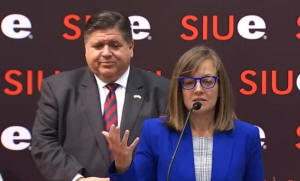Pritzker signs bills aiming to address ‘period poverty’
 Send a link to a friend
Send a link to a friend
[August 06, 2021]
By JERRY NOWICKI
Capitol News Illinois
jnowicki@capitolnewsillinois.com
 SPRINGFIELD – Three new state laws will aim
to break down barriers to feminine hygiene products such as tampons and
sanitary napkins for those who can’t afford them. SPRINGFIELD – Three new state laws will aim
to break down barriers to feminine hygiene products such as tampons and
sanitary napkins for those who can’t afford them.
Two of the laws make menstrual products available at state colleges and
universities and require homeless shelters to stock the products, budget
permitting. Another would require the state to apply for a waiver to
allow certain federal assistance funds to be used on the products,
provided the federal government makes such a waiver available.
Gov. JB Pritzker signed the measures at Southern Illinois University
Edwardsville Thursday, contrasting the state’s efforts to pass women’s
health legislation to Republican-led states such as Missouri seeking to
overturn the Supreme Court precedent of Roe vs. Wade as it pertains to
abortion rights.

“Given the high price of menstrual products such as pads and tampons,
it's no wonder that many women below the poverty line have had to
sacrifice their personal health and hygiene in order to afford food or
other basic necessities, turning to socks and toilet paper to manage
their menstrual cycle,” Pritzker said. “It's a tragic situation that
significantly increases their risk of infection and limits their ability
to live their fullest lives.”
House Bill 641 requires state universities and community colleges to
stock feminine hygiene products in any restroom in a college building
that serves students. That measure passed the House 74-37 and the Senate
42-13, each with mostly Democratic but some Republican support. It takes
effect immediately.
“We all agree, collectively, that soap, toilet paper, napkins, tissues,
seat covers and all those other things are provided for us in public
spaces,” bill sponsor Rep. Katie Stuart, D-Edwardsville, said at a news
conference. “In fact, we probably don't really ever think about it until
we're in a situation where we really need something like that, and it's
just not there. This legislation puts menstrual hygiene products in that
same category, which is exactly where they belong.”
[to top of second column]
|

Rep. Katie Stuart, D-Edwardsville, and Gov. JB
Pritzker speak at a news conference Thursday at which the governor
signed three bills aiming to break down financial barriers to
feminine hygiene products. (Credit: Illinois.gov)

House Bill 155 would require the Illinois Department
of Human Services to apply for a waiver to the federal government to
allow the use of Supplemental Nutrition Assistance Program and the
Special Supplemental Nutrition Program for Women, Infants and
Children to purchase diapers and menstrual hygiene products.
But the federal government does not currently offer such a waiver,
so the bill has no immediate effect. Rep. Barbara Hernandez,
D-Chicago, who sponsored the measure, said advocates are “formally
asking the federal government to take this step forward and help
countless women afford the products that they need.”
That bill had unanimous support in the General Assembly.
House Bill 310 requires homeless shelters that serve women and youth
to make menstrual hygiene products available free of charge. That
requirement, however, is “subject to the availability of funds in
the homeless shelter's general budget,” according to the bill.
“I cannot personally imagine the indignity of having to use some
other item as a makeshift sanitary product,” bill sponsor Sen.
Christopher Belt, D-Swansea, said at the news conference. “But I
believe people who have already been deprived of so much should not
have to suffer that, too.”
That measure passed the General Assembly with only one vote against
in the Senate and three votes against in the House. It will become
law in January 2022.
Capitol News Illinois is a nonprofit, nonpartisan
news service covering state government and distributed to more than
400 newspapers statewide. It is funded primarily by the Illinois
Press Foundation and the Robert R. McCormick Foundation.
 |